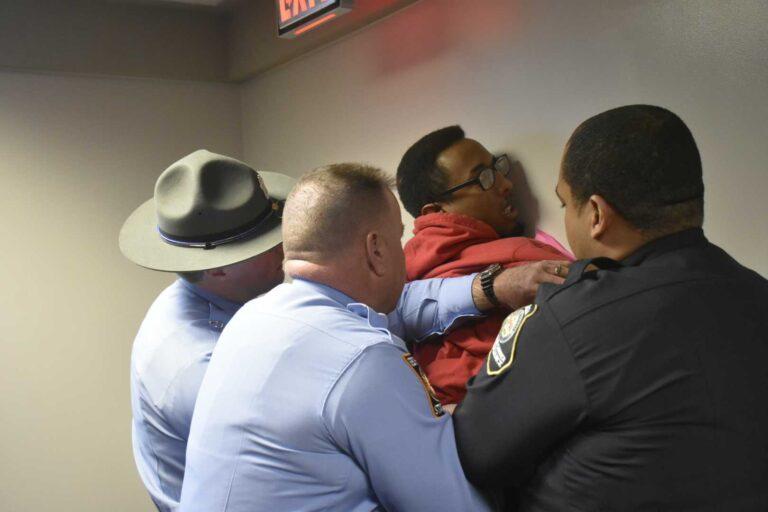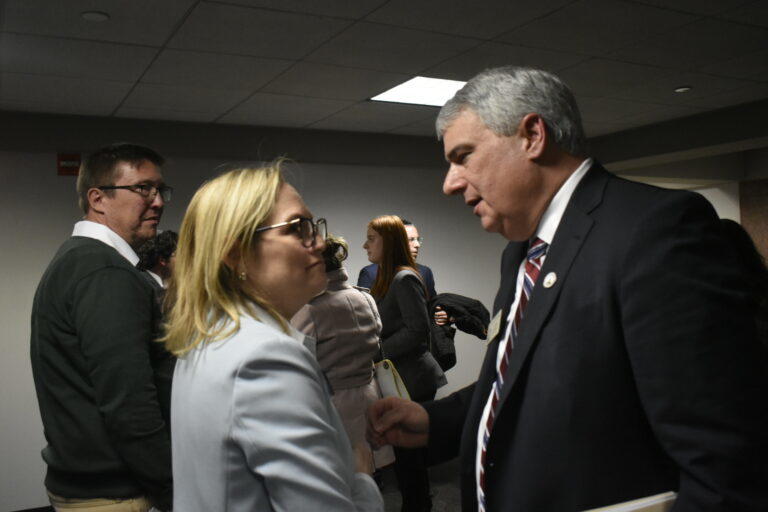
Caption
Capitol Police confirmed one person was arrested after a committee meeting was interrupted by shouting.
Credit: Ross Williams/Georgia Recorder
One person was arrested at the Georgia Capitol Monday after a contentious Senate committee hearing erupted into jeers over a controversial bill about antisemitism and Israel.
The Senate Judiciary Committee unanimously approved the bill aimed at defining antisemitism in state code. House Bill 30 by Marietta Republican Rep. John Carson would adopt the definition used by the International Holocaust Remembrance Alliance, requiring state agencies to use that definition as evidence for discriminatory intent in things like housing or employment discrimination, as well as under the state’s 2020 hate crimes law.

Capitol Police confirmed one person was arrested after a committee meeting was interrupted by shouting.
After the vote, supporters gave a standing ovation, while a handful of opponents approached lawmakers shouting “Free, free Palestine!” Officers escorted the demonstrators out and the hearing resumed quickly.
Separately, the committee voted 5-3 to advance Senate Bill 359 by Roswell Republican Sen. John Albers, which adds offenses like littering, illegal sign placement, disorderly conduct attempting to disturb a funeral, loitering and harassing communications to the state’s hate crimes law in an attempt to get at people who distribute antisemitic fliers and perform other hateful stunts.
Under HB 30, making antisemitic statements would not be a crime, but such statements could be used as evidence for enhanced penalties for underlying crimes.
The sticking point is that the definition calls certain criticisms of Israel, such as claiming it is a racist endeavor, antisemitic, which some free speech advocates say unjustly limits speech.
Georgia’s hate crimes law protects against acts based on one’s religion, but supporters say Jewishness is more than just religious, and specifically codifying antisemitism will provide more protection.
Carson has been pushing for a state definition of antisemitism for several years. Last year’s effort fell short in the committee over free speech concerns.
This year, leadership from both chambers signaled support for the bill as high-profile antisemitic demonstrations and hateful leaflet campaigns continue to alarm Jewish Georgians — and as violence in Gaza threatens to ignite a wider regional conflict.
The aftermath of the Oct. 7 Hamas attack, in which 1,200 Israelis were killed, has sparked increased sympathy for the Jewish people, but also heightened skepticism of the Israeli government. Israel’s military has killed 25,000 people in Gaza since Oct. 7, 70% of them women or children, according to the United Nations.
The House bill would prevent Georgia Jews from being targeted as a result of Israel’s policies, said Rabbi Larry Sernovitz, CEO of Hillels of Georgia. Sernovitz described an increase in antisemitic attacks, including a University of Georgia freshman who was physically and verbally assaulted shortly after Oct. 7. Sernovitz said the students’ attackers called him a “stupid, Israeli ‘F’” and were not charged with a hate crime.
“He, by the way, is a Jewish student from the metro Atlanta area and not an Israeli,” Sernovitz said. “The use of the word ‘Israeli’ instead of ‘Jew’ was integral in this decision. HB 30 would have protected him and so many others. And HB 30 includes this example of antisemitism, holding Jews collectively responsible for actions of the state of Israel.”
Rabbi Elizabeth Bahar of Temple Beth Israel in Macon described being targeted by hate groups, whose tactics included phoning in a bomb threat, hanging an effigy outside her synagogue and distributing antisemitic literature in Jewish neighborhoods.

State Reps. Esther Panitch and John Carson speak in the hallway after the Senate Judicial Committee passed Carson’s antisemitism bill. The only current Jewish member of the Legislature, Panitch has pushed hard for the bill’s passage and said she was grateful to see it moving forward Monday.
“As we address antisemitism, let us fortify the bonds that make us strong, the bonds of family, the bonds of community, and the unwavering belief in a brighter future for all Georgians and all Americans,” she said. “Together, we can reaffirm our commitment to a nation where the lamp of liberty shines brightly, dispelling the shadows of prejudice.”
Several Jewish Georgians also showed up at the meeting to speak against the bill. Political activist Marissa Pyle said the bill would do nothing to protect her from the antisemitic abuse she has suffered.
“However, what it does do is tell me, a Jewish person, that I am somehow being hateful against myself when I and Jews like me speak out about a foreign government, the Israeli government,” she said. “It gives me fewer rights to criticize a foreign government than my own under the guise of my own protection.”
Luma Younis, a Georgia Tech student from Clarkston said she worries her criticism of Israel could get her family in trouble.
“As a family who has tenants, the notion that a decision to possibly decline a Jewish applicant for reasons outside of their ethnic or religious background could be construed as discriminatory and that my vocal political stances could be leveraged against us in a legal context is profoundly distressing,” she said. “The prospect that the very words I speak today might be turned into a tool for litigation against myself or my family members is antithetical to the values of free speech and justice. This scenario presents a disregard for my constitutionally protected rights but also inaccurately conflates my criticism of Israel with antisemitism.”
Speaking to the Recorder after the committee vote, Carson said he was relieved to see the unanimous committee vote, and he’s hoping the support of Lt. Gov. Burt Jones and Speaker Jon Burns will help get the bill through both chambers.
“I’m more confident than I was last week,” he said with a laugh. “I’m cautiously optimistic that we’re going to get this done and protect the Jewish community.”
This story comes to GPB through a reporting partnership with Georgia Recorder.